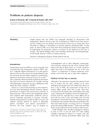 23 citations,
August 2012 in “Veterinary dermatology”
23 citations,
August 2012 in “Veterinary dermatology” Skin infections in cats are more common than thought, often affect young cats with allergies, and need better treatments.
 July 2024 in “Indonesian Journal of Case Reports”
July 2024 in “Indonesian Journal of Case Reports” Effective treatment improved skin and overall symptoms in a lupus patient.
 7 citations,
October 2012 in “S. Karger AG eBooks”
7 citations,
October 2012 in “S. Karger AG eBooks” Some conditions mimic PCOS symptoms and need careful diagnosis to treat potentially serious health issues.
 2 citations,
October 2018 in “Springer eBooks”
2 citations,
October 2018 in “Springer eBooks” Cancer treatments can cause skin-related side effects that may affect patient quality of life and require changes in treatment.
 20 citations,
October 2013 in “British Journal of Dermatology”
20 citations,
October 2013 in “British Journal of Dermatology” The document concludes that clinicians should be aware of common hair and scalp disorders in women of African descent and that more research is needed to develop effective treatments.
 85 citations,
June 2008 in “Annals of the New York Academy of Sciences”
85 citations,
June 2008 in “Annals of the New York Academy of Sciences” PCOS starts in adolescence with hormonal issues, leading to adult health problems, and early treatment is crucial.
 4 citations,
January 2018 in “Cancer treatment and research”
4 citations,
January 2018 in “Cancer treatment and research” The document concludes that systemic therapy is becoming more important in treating head and neck cancer, with new treatments showing promise.
 13 citations,
November 2022 in “Chemical Science”
13 citations,
November 2022 in “Chemical Science” Inorganic-based biomaterials can quickly stop bleeding and help wounds heal, but they may cause issues like sharp ion release and pH changes.
 October 2024 in “Medicine”
October 2024 in “Medicine” Cronkhite-Canada syndrome is rare, has a poor prognosis, and requires early diagnosis and ongoing treatment.
 22 citations,
July 2014 in “Hormones”
22 citations,
July 2014 in “Hormones” Metformin may help treat neuroendocrine tumors.
 475 citations,
January 2016 in “International Review of Psychiatry”
475 citations,
January 2016 in “International Review of Psychiatry” The document concludes that non-binary individuals need compassionate support and recognition in healthcare, without being pathologized.
 March 2014 in “Pediatric Clinics of North America”
March 2014 in “Pediatric Clinics of North America” The document discusses how to identify and manage common skin conditions in children.
54 citations,
June 2020 in “Pharmaceutics” New nanocarriers improve drug delivery for disease treatment.
 64 citations,
May 2003 in “Journal of health psychology”
64 citations,
May 2003 in “Journal of health psychology” Women with excess body hair feel psychological distress influenced by societal beauty standards, but distress isn't directly linked to the amount of hair.
 January 2024 in “The Journal of Dermatology”
January 2024 in “The Journal of Dermatology” Taking finasteride every other month can still help with hair loss but may be less effective over time compared to taking it daily.
 1 citations,
February 2022 in “Journal of the American Academy of Dermatology”
1 citations,
February 2022 in “Journal of the American Academy of Dermatology” The document concludes that improving patient safety and quality is increasingly important in dermatology.
 11 citations,
February 1980 in “BMJ. British medical journal”
11 citations,
February 1980 in “BMJ. British medical journal” Hirsutism is common body hair growth due to genetics and hormones, and while not a disease, it can be distressing; virilisation includes hirsutism with other male traits and needs medical attention.
 15 citations,
August 2020 in “BioMed Research International”
15 citations,
August 2020 in “BioMed Research International” BTA safely and effectively treats hair loss, and works better with FNS.
 12 citations,
June 2020 in “Dermatology and therapy”
12 citations,
June 2020 in “Dermatology and therapy” Platelet-Rich Plasma (PRP) can promote new hair growth and increase hair density, but its effectiveness varies depending on the type of hair loss.
 5 citations,
June 2012 in “Journal of Cosmetic Dermatology”
5 citations,
June 2012 in “Journal of Cosmetic Dermatology” Female pattern hair loss diagnosis is challenging and should use dermoscopy and histopathology instead of pattern recognition, as hormones may not always be the cause.
 January 2008 in “The New England Journal of Medicine”
January 2008 in “The New England Journal of Medicine” Children receive less than half of recommended health care, and routine hormonal testing for female-pattern hair loss is unnecessary without other androgen excess symptoms.
 65 citations,
January 2017 in “Postępy Dermatologii i Alergologii”
65 citations,
January 2017 in “Postępy Dermatologii i Alergologii” High-frequency ultrasonography is a useful but underused tool in dermatology for assessing skin cancers, monitoring diseases, and evaluating treatments.
 1 citations,
April 2023 in “International Journal of Molecular Sciences”
1 citations,
April 2023 in “International Journal of Molecular Sciences” New CRISPR/Cas9 variants and nanotechnology-based delivery methods are improving cancer treatment, but choosing the best variant and overcoming certain limitations remain challenges.
 60 citations,
March 2014 in “Veterinary dermatology”
60 citations,
March 2014 in “Veterinary dermatology” Cats with atopic dermatitis often have severe, year-round itching and respond well to certain treatments.
 36 citations,
January 2012 in “International Journal of Trichology”
36 citations,
January 2012 in “International Journal of Trichology” Losing eyelashes or eyebrows can be a sign of many different health problems and needs a careful approach to treat effectively.
 January 2025 in “Frontiers in Immunology”
January 2025 in “Frontiers in Immunology” IVIG therapy significantly improved symptoms in a patient with APS-2 and SPS.
 14 citations,
October 2012 in “Clinics in Plastic Surgery”
14 citations,
October 2012 in “Clinics in Plastic Surgery” Adding stem cells to fat grafts for facial rejuvenation might improve outcomes, but more research is needed to confirm safety and effectiveness.
 17 citations,
July 2017 in “International Journal of Behavioral Medicine”
17 citations,
July 2017 in “International Journal of Behavioral Medicine” The Egyptian Arabic Skindex-16 is a reliable way to measure how skin diseases affect quality of life in Egyptian patients.
 December 2023 in “Frontiers in endocrinology”
December 2023 in “Frontiers in endocrinology” Excess androgens may cause PCOS, not just be a symptom.
 8 citations,
October 2022 in “Regenerative Therapy”
8 citations,
October 2022 in “Regenerative Therapy” New regenerative treatments for hair loss show promise but need more research for confirmation.





























